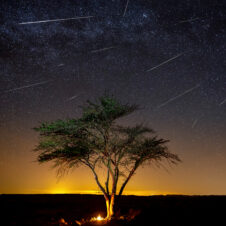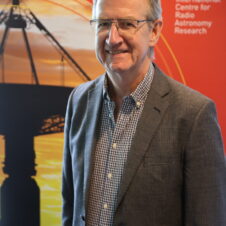Citizen scientists name planet
Volunteers from the Perth based citizen astronomy project theSkyNet have won the right to name a planet around a distant star as part of a global contest run by the International Astronomical Union (IAU).
The winning name is Thestias, the grandfather in Greek mythology of Pollux, which is the name of this ‘exoworld’s’ star.
Astronomy community groups around the globe were invited by the IAU to suggest names for 19 ‘exoplanet’ systems spanning the galaxy. The suggested names were then put to a worldwide public vote, and theSkyNet project’s suggestion came out on top for one of the 19 planet groups.
Prior to submission to the global vote, theSkyNet’s volunteers were invited to pitch their best planet names to an internal competition to determine which suggestion would be submitted to the IAU.
Based at the International Centre for Radio Astronomy Research (ICRAR), theSkyNet has over 200,000 volunteers globally, more than 7,000 of which are active at any one time.
After 43 ideas and an internal vote amongst volunteers, the submission was made for the planet around Pollux. Pollux is a bright star in the constellation Gemini, right near the constellation Orion, and the ‘saucepan’–a grouping of stars that’s well known throughout Australia.
The planet now known as Thestias is more than twice as large as Jupiter and was officially discovered in 2006 by astronomers in the United States.
As part of the naming of Thestias, the team at theSkyNet will also have the chance to name a Minor Planet within the Solar System’s asteroid belt, the name of which will become official sometime in mid 2016.
Volunteer Rich Matthews from the USA submitted the original proposal to name the planet around Pollux to theSkyNet, and after a change suggested by the IAU to avoid confusion with other objects in space, Thestias was officially named today.
More information is available in the following announcement from the International Astronomical Union. Images and press contacts are included at the bottom of the page.
Final Results of NameExoWorlds Public Vote Released
The votes are in — the names of 19 “ExoWorlds” (14 stars and 31 exoplanets orbiting around them) have been chosen by public vote in the NameExoWorlds contest, and accepted by the IAU. Reflecting the truly international interest in astronomy, over half a million votes from 182 countries and territories contributed to the new official designations of the alien worlds.
Although people have been naming celestial objects for millennia, the International Astronomical Union (IAU) is the authority responsible for assigning official names to celestial bodies. The NameExoWorlds contest provided the first opportunity for the public to name exoplanets, and their stars. The winning names are to be used freely in parallel with the existing scientific nomenclature, with due credit to the clubs or organisations that proposed them.
With voting concluding on 31 October 2015, a total of 573 242 votes from the public have contributed to the naming of 31 exoplanets and 14 “host stars” beyond our own. Proposers of the winning names are to be awarded a plaque commemorating their contribution to astronomy and they will be given the exciting opportunity to name a minor planet.
The public voted on the 274 proposed ExoWorld names submitted by a wide variety of astronomy organisations from 45 countries all over the world (iau1511) — these included amateur astronomy groups, schools, universities and planetariums. The successful entries were received from across the globe — 4 were received from North America (USA, Canada), 1 from Latin America (Mexico), 2 from the Middle East & Africa (Morocco, Syria), 6 from Europe (France, Italy, Netherlands, Spain, Switzerland), and 6 from Asia-Pacific (Australia, Japan, Thailand).
The IAU Executive Committee Working Group on the Public Naming of Planets and Planetary Satellites validated all individual cases of the winning names from the vote, as stipulated in the guidelines, and made appropriate modifications to the original proposals where necessary, in full agreement with the proposers.
However, after extensive deliberation, the Committee decided to annul the vote for one particular ExoWorld — tau Boötis — as the winning name was judged not to conform with the IAU rules for naming exoplanets. To this end, the IAU will organise a new contest to decide the name of tau Boötis in the future.
The newly adopted names take the form of different mythological figures from a wide variety of cultures from across history, as well as famous scientists, fictional characters, ancient cities and words selected from bygone languages:
| Star | 14 Andromedae | Veritae |
| Planet | 14 Andromedae b | Spe |
| Star | 18 Delphini | Musica |
| Planet | 18 Delphini b | Arion |
| Star | 42 Draconis | Fafnir |
| Planet | 42 Draconis b | Orbitar |
| Star | 47 Ursae Majoris | Chalawan |
| Planet | 47 Ursae Majoris b | Taphao Thong |
| Planet | 47 Ursae Majoris c | Taphao Kaew |
| Star | 51 Pegasi | Helvetios |
| Planet | 51 Pegasi b | Dimidium |
| Star | 55 Cancri | Copernicus |
| Planet | 55 Cancri b | Galileo |
| Planet | 55 Cancri c | Brahe |
| Planet | 55 Cancri d | Lippershey |
| Planet | 55 Cancri e | Janssen |
| Planet | 55 Cancri f | Harriot |
| Planet | Ain b (epsilon Tauri b) | Amateru |
| Planet | Edasich b (iota Draconis b) | Hypatia |
| Star | epsilon Eridani | Ran |
| Planet | epsilon Eridani b | AEgir |
| Planet | Errai b (gamma Cephei b) | Tadmor |
| Planet | Fomalhaut b (alpha Piscis Austrini b) | Dagon |
| Star | HD 104985 | Tonatiuh |
| Planet | HD 104985 b | Meztli |
| Star | HD 149026 | Ogma |
| Planet | HD 149026 b | Smertrios |
| Star | HD 81688 | Intercrus |
| Planet | HD 81688 | Arkas |
| Star | mu Arae | Cervantes |
| Planet | mu Arae b | Quijote |
| Planet | mu Arae c | Dulcinea |
| Planet | mu Arae d | Rocinante |
| Planet | mu Arae e | Sancho |
| Planet | Pollux b (beta Geminorum b) | Thestias |
| Star | PSR 1257+12 | Lich |
| Planet | PSR 1257+12 b | Draugr |
| Planet | PSR 1257+12 c | Poltergeist |
| Planet | PSR 1257+12 d | Phobetor |
The complete result, including vote counts, proposers, and citations are published on the IAU NameExoWorlds website.
More Information
The IAU is the international astronomical organisation that brings together more than 12 000 professional astronomers from almost 100 countries. Its mission is to promote and safeguard the science of astronomy in all its aspects through international cooperation. The IAU also serves as the internationally recognised authority for assigning designations to celestial bodies and the surface features on them. Founded in 1919, the IAU is the world’s largest professional body for astronomers.
Links
• IAU NameExoWorlds website
• IAU Naming Theme
• Naming of Exoplanets
• TheSkyNet Citizen Science Project
• International Centre for Radio Astronomy Research
Contacts
Kirsten Gottschalk
Astronomy Ambassador
International Centre for Radio Astronomy Research, Perth
Tel: +61 (0)8 6488 7771
Mobile: +61 (0)438 361 876
Email: kirsten.gottschalk@icrar.org
Sze-leung Cheung
IAU International Outreach Coordinator
Tokyo, Japan
Tel: +81-(0)422-34-3896
Cell: +81-80-92742454
Email: cheungszeleung@iau.org
Thierry Montmerle
Chair of the IAU Executive Committee Working Group “Public Naming of Planets and Planetary Satellites”
IAU Former General Secretary, Institut d’Astrophysique de Paris
Paris, France
Tel: +33 1 43 25 83 58
Email: montmerle@iap.fr
Lars Lindberg Christensen
IAU Press Officer
Garching bei München, Germany
Tel: +49 89 3200 6761
Cell: +49 173 3872 621
Email: lars@eso.org




